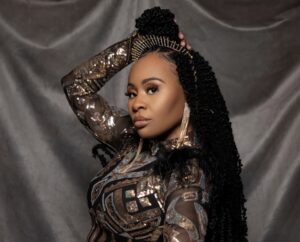What Late Diagnosis Was Like as a Black Autistic Woman

I always knew something was “different” about me, but I didn’t know what. Nobody else did either, including my parents, family, and educators. I didn’t speak much. People would say hello to me and I would ignore them or just turn away. I would go sit in the corner and draw for hours because it was an easier way for me to communicate than speaking. It was a place for my emotions when they didn’t fit anywhere else. People would ask, “What’s wrong with her?” Most of the time, I would just be called “crazy,” “moody,” “shy,” or a “brat”, but I was far from any of those things. I did not have a lot of friends, and I was bullied most of the time. I didn’t understand I was being teased or tormented. It just felt like I was being treated differently. When I was in plays as a child, I would always get the role I auditioned for, and sometimes that meant a friend who auditioned for the same part would stop speaking to me, call me names, and get others to stop speaking to me as well. I had anxiety, but none of us knew what it was at the time, and I was autistic, which no one knew either.
A Weight Lifted
I had a late diagnosis. I believe this was partly because there is a myth that Black girls don’t have autism, so it would never be something they would think to test me for. When I was diagnosed, it hadn’t been the first time I had heard I could possibly be on the spectrum. Years before, my therapist had mentioned I seemed like I could be on the spectrum, but never did anything about it or took any further steps to help me get some answers. When my team of doctors sat down to discuss it with me, they asked me if anyone ever mentioned to me I may be on the spectrum. I was hospitalized at the time, so this is where my evaluation was done. It took hours; I couldn’t focus or sit still and I was getting aggravated. We took several breaks and they were very understanding.
My test results were not a surprise to me. It was hard to accept, but it was also a huge weight lifted off my shoulders. There was a reason I am the way I am. There was a reason I struggle to communicate, have sensory issues, have nonverbal periods, etc. It gave me a better understanding of myself. Learning I was autistic changed my life because I could now teach people how to and not to treat me. I could now handle situations better, because I was aware of the reason my mind reacts to situations and information the way it does. I understood I was not having tantrums, I was having autistic meltdowns. I understood I wasn’t having shutdowns, I was experiencing autistic burnouts. In many ways, it did not change me. My character, my heart, and my outlook on life are all still the same. I was still me. I just now know what I’ve dealt with my entire life.
Misconceptions Contribute to Invisibility
Common misconceptions I have seen include: “Black people do not get autism,” “people with autism are ‘stupid,’” and “people with autism have no empathy.” These are false. I’m Black and I have autism. I’m not “stupid,” although I may need things explained to me in a different way than a non-autistic person. I am also very empathetic. Everyone has dealt with others not believing in them and I’ve dealt with this, too, but the people who don’t believe in me do not matter to me. Those who really care about you and value their relationship with you will believe in you and your dreams.
What I Want Other Autistic Adults to Know
I hope others know staying positive helps a lot. I always want those living with autism (or any other challenges) to know they should never put limitations on themselves and they should definitely not let others put limitations on them. If you have a dream and passion, you can do it. Some days will be really hard, but others will be really great. I choose to focus on the really great. Every day will not be wonderful, but we have the next coming day for another chance at happiness, another opportunity for joy, and another day to fight again. Even though it may get extremely hard, never give up. Know the pain won’t last forever, and hold on. Forget all the rules written for people with autism and live your life the way your heart desires for you to live it. Don’t accept something is “wrong,” just know you are different, and different is beautiful. Different is special.
The views above are a reflection of the author’s views and are not necessarily a reflection of the views of Madison House Autism Foundation (MHAF). MHAF aims to share the varied voices of the autism community. This sharing comes with the knowledge that no one voice is fully representative of the community as a whole. Each story helps to shine some light onto the various experiences of autistic adults and their families.

 A Chance to Be An Advocate for Her Autistic Son
A Chance to Be An Advocate for Her Autistic Son


